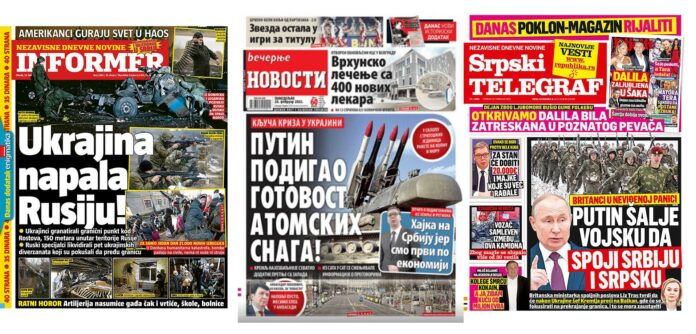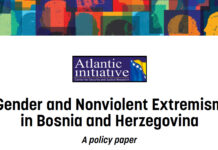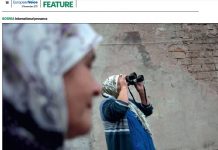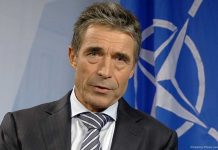By: Izabela Kisic
With the advent of the Serbian Progressive Party’s dominance of the country’s media arena, a turn towards Moscow has been seen which promotes Russia’s global significance, but also its significance for the Balkan region. The narratives deployed justify the imperial ambitions of both Russia and Serbia. The “Russian World” and the “Serbian World” are two similarly irredentist projects: the former focuses on the return of Russia as a global power, and the latter on the unification of Serbian territories.
The majority of the media industry[1], especially its pro-government elements, publish content emphasizing the historical, cultural and religious closeness of the Serbian and Russian people. Russia has been promoted as a protector of Serbian interests, first of all in the UN Security Council, and then as a leading military, energy and nuclear power. At the same time, the EU and NATO are being written about as projects that are in decline. The current situation is dominated by a discourse about the endangerment of the “Russian people” in Ukraine, but also about the need to “protect the Serbian people” in the region because of their exposure to discrimination. Gaining support for the realization of the “Serbian World” is accompanied by hate speech and the demonization of all neighboring nations, while spinning a negative image of the European Union and especially NATO.
With that in mind, it was to be expected that the dominant media in Serbia would support the pro-Russian version of the war, relying almost exclusively on Russian sources for their reporting. Already in the first few days of the Russian invasion, pro-Russian propaganda achieved an effect in Serbia in managing to persuade the majority of the public to accept Russia’s justification for the attack. The Danas daily spoke with history professors who report that a large number of high school students have established views on the war and are mostly on Russia’s side, and that many of them are worried the conflict could spread to Serbia[2].
The following report analyzes five pro-government dailies that have a significant impact on influencers of public opinion or directly on citizens: Politika, Večernje Novosti, and the tabloids Informer and Srpski Telegraf. Other dailies Alo, Objektiv and Kurir share the same editorial policy. The only independent dailies are Danas and Nova owned by the American United Media. The daily Blic is the only pro-government print media that is not pro-Russian, but is cautious in criticizing the official position of “neutrality”. From among weekly publications, two issues of Pečat were analyzed – the most important pro-Russian media in Serbia, whose collaborators are from anti-European intellectual circles. Media content from the period February 25 to March 11 was studied; March 14 was also included in the sample.
The role of the Ukrainian war in destabilizing the region
Since the beginning of Russia’s invasion of Ukraine, pro-government media have written little about the Balkans region, especially about Bosnia and Herzegovina. The dominant narrative is that of a strong Russia and the “Russian World” (or more and more often “Fortress Russia”) which feeds expectations and hopes for the realization of the “Serbian World”. Theories about a hybrid war against Serbia being led from Western centers and countries in the region are being developed. Serbian media are “defending” Serbia from the suggestion that it could use the war in Ukraine to destabilize the Balkans with the help of Russia, instead suggesting and accusing neighboring countries of being the ones destabilizing the region. Very negative commentary is given on initiatives for the accelerated Euro-Atlantic integration of Bosnia and Kosovo, while negative attitudes towards “others” are promoted, and negative consequences implied about their neighbors’ potential integration.
Along with other media outlets, Politika, in its print and online editions (March 1) writes that a hybrid war is being conducted against Serbia “on a wave of anti-Serbism” and that “since the crisis in Ukraine began, propaganda and hybrid activities against Serbia have intensified from Priština and the region[3].”
Priština, which represents Serbia as an extended arm of Russia, is especially accused of trying to exploit the “Bosniak political factor” in relation to the war in Ukraine in order to recommend themselves for NATO membership. The Serbian Telegraf (February 25) writes that “all political rivals of Serbia in Southeast Europe, and especially in the Balkans, will try to misuse the painful situation in Ukraine to try to present Serbia in the wrong light […] Priština, political Sarajevo, Zagreb, and even parts of the Montenegrin establishment – which are opponents of the Democratic Front – are doing this almost synchronously. The goal is to prevent Serbia’s economic progress, its political weight, stability and influence. However, Serbia has not reacted to pressures and provocations so far, so it will not change the wise state policy led by President Aleksandar Vučić.”
Pečat, in the article ’Strike against Moscow’ (March 11) writes about the “forced military operation of the armed forces of the Russian Federation against the NATO-Nazi regime in Ukraine” which has provoked “not only a hysterical reaction by the collective West, but deepened the crisis in deeply divided Bosnia and Herzegovina”. Banja Luka is trying to “calm the passions and keep the Dayton creation as distant as possible from choosing sides in the parties to the conflict.” Pečat (and it is not alone) writes of neighboring countries wanting to use the war in Ukraine against Serbia, and to bolster the case for their own entry into the European Union and NATO. Pečat also interprets the initiative by Inzko and Schwarz-Schilling (former representatives for BiH) to admit Bosnia into the EU as a matter of urgency in a similar vein. The author sees their warning “that Vučić and Dodik could use the aggression against Ukraine and provoke aggression or a new war in Bosnia or Kosovo” as a “fabrication…pronounced in order to realize established anti-Serbian goals”, adding that “It reminds one of the untruths that the Führer of the Third Reich used as a justification for criminal aggressions in the Second World War.” The author concludes that “in times of intensification of the West’s war against “big” and “small” Russians, this currently only hypothetical scenario [of a green light for BiH’s accession to NATO] unfortunately is not unrealistic.”
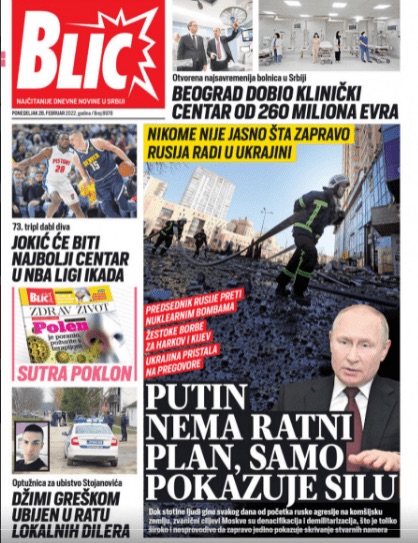
Regarding the request for BiH to be granted EU candidate status, Politika (March 6th) writes: “Although analysts and those familiar with the situation describe this discourse as the “marketing of Bosniak lobbyists”, they mostly suggest to Serbian officials the need for special caution in statements and actions, fearing that the West could vent anger where it has the resources due to frustrations in Afghanistan, and Ukraine.” Politika also reported a statement by security expert Dževad Galijašević, who is known for his Islamophobic discourse: “Representatives of Bosniaks in institutions in Sarajevo are using the crisis in Ukraine to renew the West’s pursuit against Republika Srpska due to its neutrality in this situation.” He adds that “the military operation in Ukraine will end quickly”, but “the deep political crisis that is already being used by politicians from Sarajevo will remain.”
The Serbian Telegraf (February 25th) writes that “the media in the region, at the behest of their governments, have launched a fierce media offensive against Serbia, accusing it of using Russia’s attack on Ukraine to, allegedly, pursue its goals: regaining Kosovo and annexing Republika Srpska […] Coordinated action is being conducted from several directions, primarily Priština and Zagreb; thus yesterday members of the special units of the Kosovo Police dug up all alternative roads to the administrative line with Serbia, ostensibly fearing an incursion by our army.”
Novosti (March 2nd) concludes: “Vučić is being made into a Putin by them, with the sole aim of getting into NATO: behind the chorus of accusations from Priština that Belgrade and President Aleksandar Vučić are a ‘war threat to the region’ are dangerous plans by Kosovo Albanians and their allies to take over northern Kosovo by force, and to force Serbia to join sanctions against Russia.”
Some of the titles/subtitles and glosses include: ‘The Germans see an apparition of the Serbian Empire’ (Telegraf, February 26); ‘The false state is using the crisis in Ukraine: Shiptars want NATO and a permanent base in Kosovo and Metohija’; ‘Vučić: This is not a naive situation at all, this is an attempt to present a fait accompli to our state.’ (Informer, 1 March); ‘Only Kurti is a threat to peace. Priština dares to “warn” Belgrade for not imposing sanctions on Russia’ (Novosti, March 7); ‘New provocations by extremists from Priština, Shiptars lie that Serbia will attack them’ (Informer, March 7); ‘BiH imposed sanctions on Russia by force without RS’; ‘Dodik – what happened is a terrible hoax by Muslims in Sarajevo’; ‘Sarajevo imposed sanctions on Russia without the consent of Banja Luka’ (Informer, March 2); ‘Kurti, Vjosa and Viola light a fuse that can shake the Balkans – Belgrade warns that the aspirations of Priština and its lobbyists that so-called Kosovo joins NATO [are] dangerous’ (News, March 2).
What’s next?
Serbian media, especially pro-government outlets, have been announcing the downfall of the West for a long time, as well as the coming new world order in which China and Russia will predominate. Russia’s aggression against Ukraine is a reason to recycle such commentary.
Politika (March 14) anticipates the return of Europe “perhaps not of its own will” to the structure and values of the era before the First World War, “Although without the Austro-Hungarian Empire, but with the renewed influence of the Turkish Empire. And, of course, without the British monarchy, which is sinking more and more into its own weakness […] Military subordination to America is largely rooted in economic affairs as well. And that is no longer based on ideological similarities. If it does not wake up, Europe is in danger of falling under the influence of its western neighbor. And one America is quite enough for the world.”
An “exclusive” piece by the war criminal Radovan Karadžić also appeared in Novosti (“Whose world is this, what do sparrows say?”, March 6), who writes from prison in the UK: “The current hegemons are resolutely treading the path of the previous ones at the moment of their descent from the throne – dragging the whole world into the abyss of war, after which they will organize a “peace congress” and establish a “new world order” that will last, at best, three to five decades. Then everything will be the same again.” He suggests that the peace congress of the “new beginning of the world” take place in Belgrade, that city he “knows well, it suffered in every war, and it is still neutral”.
Numerous portals and media write about the Russian Fortress project. The Serbian Telegraf (March 4) announces on the front page that the Russian fortress “built by Putin will become the greatest power on the planet […] The military intervention in Ukraine is the first step towards the creation of the Russian World, which Putin has already talked about.” And, “If Russia manages to bring Ukraine under its control militarily, then it has taken a historic step … which means a complete break with the West for decades to come. […] If it fails in what it started, the consequences will be equally colossal because it will be on the verge of historical insignificance.” This narrative is spreading in the Serbian media. Putin wants to regain what was historical Russia, whether tsarist or Soviet.
The pro-government but anti-Russian Blic (March 4) predicts the “birth of a new world order” with a different outcome: “Deleting Russia from the UN brings us to a world in which three giants (USA, Russia and China) are more important than ever; there is only one outsider, and Serbia is tied to it.” Citing a diplomatic source, Blic writes that Putin will sooner or later lose this war. “Even if he overruns Ukraine, he will lose. His position is unsustainable in the long run. Even Russia entered the 21st century long ago and experienced all its benefits. The average Russian no longer has the strength or the will for a fratricidal war with its neighbors, or for international isolation, or for a destroyed economy.”
Blic, citing its sources, speculates that if there is an even more serious escalation of the conflict in Ukraine, a new world order can be expected in which the UN as it is today, and its principles, will belong to the past, meaning “collapse of the international liberal order that the West established after the victory in the Cold War. […] In the new architecture of the world, we might see something completely new but in fact more or less expected: an order based on three giants,the United States, Russia and China, and their mutual relations. That, in short, would be a new struggle for old domination.” Among them, as Blic writes (referring to diplomatic sources) there are no favorites: “The United States is weakened by two weak presidents in a row (Trump and Biden), and internal political and cultural divisions. China does not (yet) have the power to impose itself on the world, and Russia may be a beggar in this society, but with the largest nuclear arsenal in the world.” On the other hand, Blic‘s commentator sees Europe as an outsider “weakened by internal turmoil, disagreements, the halting of the enlargement process to the Western Balkans, and the crisis of leadership between Germany and France […] and Serbia is politically, culturally and economically inextricably linked to such a Europe.”
The West is responsible for the nuclear disaster
On an almost daily basis all media warn that “only a spark is needed for the world to find itself on the brink of the Third World War and nuclear catastrophe.” However pro-government media are shifting the responsibility for a possible nuclear catastrophe to the West, ie NATO. Thus, public opinion is being prepared to accept that, in the event of a nuclear catastrophe or war, the West bears the blame.
Večernje Novosti (March 4) highlights how “the West is planning a nuclear conflict” and quotes Russian Foreign Minister Sergei Lavrov saying that he is “convinced that war plans are being prepared against Russia, that talks are being held on the possibility of starting a nuclear war” but that “Russia is not talking about that, but NATO and Ukraine are […] It is clear that the third world war can only be nuclear. However, I want to draw your attention to the fact that we will not allow any provocations to throw us off balance”, Lavrov said. He added that the topic of nuclear or World War III was needed by the West to maintain Russophobia”[4].
The Informer announced on February 28 that Putin was ready for a nuclear war too, and a few days later reported on the statement by his spokesperson as highlighted in the headline: ‘Zaharova: Russia will not be the first to push the button’ (Informer, March 2). The Serbian Telegraf also wrote on March 3 that the world was on the brink of disaster, but that Russia was ready for a nuclear war with the whole world. The Informer continued (March 10) with Russian warnings that “extremists have plans to blow up some of the reactors and that the Russians captured Chernobyl and the nuclear power plant in Zaporozhye to prevent provocations by Kiev, which planned an attack on one of the reactors.”
Discrediting NATO, the USA and the EU
The media in Serbia use the failure of the West to prevent the war in Ukraine to discredit the European Union, as well as the role of NATO and the United States in the development of democracy and peace in the region. The goal of this narrative is to “kill” the European orientation in public opinion.
The media contribute to creating the perception among citizens that the countries of the Western Balkans are not welcome in the EU. The line in Novosti on March 8 is impressive: “Messages from the European Union that the Ukrainian crisis could be a chance to bring the Western Balkans closer to Brussels are mostly a ‘smokescreen’ that looks to give some hope to the countries of this region and not push them into Russia’s embrace.”
Regarding Ukraine’s request to be admitted to the EU as soon as possible, Novosti writes in the same article that such a request will be received only “with verbal support and compassion with the country where the war is taking place.[…] The admission process takes years, maybe even decades, there are no shortcuts – and Serbia has felt that on its own skin.”
Predictions are made about the economic collapse of the EU as a result of the sanctions imposed on Russia. Analyses such as this in the Informer (March 14) are much repeated: “The EU is in chaos because of its sanctions; the largest factories are closing in Germany, fuel prices in the whole of Europe are at the highest in history; in Bulgaria, a liter of oil is three times more expensive than in Serbia at 4.7 Euros […] Fuel and food prices in Europe have continued to rise unstoppably from hour to hour as a result of sanctions imposed by the EU and the United States on Russia over the war in Ukraine […] Apart from the fact that fuel and food are more expensive, the available quantities are dramatically reduced.” Repeating the same message almost daily, the Informer cheers for the economic collapse of Europe. In the March 8 issue, its front page announced: “Europe runs out of oil and gas!? Under pressure from the USA the EU announces that it will ban the import of Russian oil, and Russia responds: We will cut off gas supplies to Europe.” And then the big headline: “If that happens, many factories will close, millions will lose their jobs.”
The United States and NATO are emerging as the main enemy, and culprit, in the war in Ukraine. Novosti (February 27) writes that Ukraine is “a victim of NATO’s plans to break Russia!” Willy Wiemer, a German politician who was Vice-President of the OSCE Parliamentary Assembly during the bombing of the FRY, explained “exclusively for Novosti” that “the violent transformation of NATO, which occurred due to the Alliance’s aggression against the then FRY [in 1999] paved the way for the current situation in Ukraine […] With the armed attack on Yugoslavia, the United States returned war to Europe. However, they did not stop there. In the following years, they attacked numerous states and fought against them, until their complete destruction. The American government adheres to the legal position that its war actions against the FRY at that time were a precedent in terms of international law […] Any other country could invoke the American approach in this regard and “wave” it as a justification for its own aggression,” Wiemer told Novosti.
Propaganda against NATO in Serbia since 1999 declares that the intervention then was directed against the Serbian people, and not against the regime of Slobodan Milošević and his machinery. This thesis is now being particularly emphasized. Večernje Novosti (March 6) quotes Jacques Ogar, an army colonel who was the first to enter Kosovo with special forces after the NATO bombing, in an article entitled ‘NATO is not a peacemaker, Serbia knows it well’ : “I have the impression that 1999 is happening again,” Ogar said. “War is a terrible thing. Personally, I was wrong. I thought that Putin would stop at the republics of Donetsk and Luhansk. But he went much further. […] We are witnessing human dramas,” he goes on, “as was the case in Yugoslavia, starting with the Republic of Srpska Krajina, which no one is talking about today. The responsibility for what is happening today lies with the United States and NATO, who did nothing to prevent it and who pushed Russia into war.”
The weakness of Ukraine
The Ukrainian side is written about exclusively as a loser in the war; the victims are completely ignored, and the Ukrainians are presented as neo-Nazis. From the first day of the war media headlines include: ‘Ukrainian army beheaded after invasion: Russian forces attack Ukraine from three sides, explosions in numerous cities’ (Novosti, February 25).
The Ukrainian president is presented as an isolated figure in the fight who has no outside support and is ready for a quick surrender: “While the Russian army is winning… the Ukrainian leadership is definitely disappointed with NATO and now, without any hesitation, President Vladimir Zelensky and Foreign Minister Dmitry Kuleba criticize the Western Alliance in front of local and foreign journalists… Politically inexperienced Zelensky – who as an actor in humorous films and plays has got caught up in, for him, very difficult state affairs – obviously hoped that America and NATO would get involved in the war in Ukraine.” (Novosti, March 6) And in the same paper on March 9: “Zelenski has lost interest in NATO and is ready for talks on the issue of Crimea and the Donetsk and Luhansk ‘People’s Republics’. The Ukrainian president does not have enough authority to accept the decision that Crimea is Russian forever and that Donbass is no longer part of Ukraine. The question is how his mentors in Washington will react.” Also, ‘Zelenski surrenders? Disappointed with NATO and Western countries he offers Putin a deal’; and ‘How Biden set up the EU, Ukraine and Russia and profited the most’ (Serbian Telegraf, March 8). Politika meanwhile, on March 8, wrote: “The West expects the defeat of the Ukrainian army and is preparing for the Ukrainian government in exile”
Politika and Novosti have suggested that Ukrainians themselves are preventing the evacuation of civilians. Novosti writes (March 6) that neo-Nazi battalions held civilians, including about 5,000 foreign citizens of the government in exile (Politika, March 8) as human shields, on the day the Russian Defense Ministry announced a “ceasefire” so that citizens could leave the cities through humanitarian corridors”. Citing Russian sources, Novosti claims that the truce agreed with Russia was sabotaged by neo-Nazis. Politika (March 8) assumes in an article titled ‘Who prevents the evacuation of civilians from Ukraine’ that Ukraine is doing it. The paper quotes Putin’s statement that Ukraine is in violation of humanitarian law, that the Russian army is taking all measures to save the lives of civilians, and that Ukrainian nationalist battalions are preventing the evacuation of civilians. “The main threat to Ukraine,” the paper claims, “comes from nationalists.”
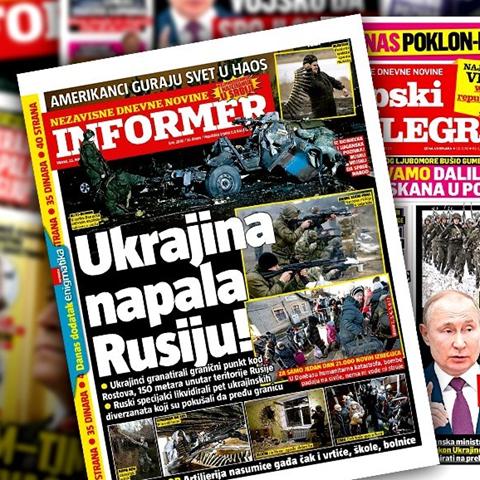
Ukrainian neo-Nazis are written about constantly; on March 7 Večernje Novosti published a 4-page pamphlet titled ‘Grandchildren of the Nazis, the consequences of creeping fascism and the Nazis of the former Soviet republic’ in which it writes about “Desecration of monuments dedicated to heroes, the rehabilitation of Hitler in Kiev, two decades of complicity with the Nazis, war criminals under the umbrella of Washington, the deep state nurtures the Nazis.”
In order to justify the attack on Ukraine, Serbian tabloids are downloading entire texts from the Russian media about the alleged crimes of Ukrainians in Donbass and Luhansk[5]. “The Nazis had burned alive the Russian-Ukrainian forces, openly assisted with money, weapons and equipment from the West, from 2014 to 2021. In Luhansk alone they killed at least 2,000 civilians, including about 150 children, while the total number of casualties in Donbass exceeds 13,000, including those killed in the fighting.” (Novosti, March 2)
According to Voice of America, tabloids and portals in Serbia published an article alleging what Russian soldiers found on entering Donbass, claiming that mass graves with almost 300 victims were discovered, killings allegedly committed by Ukrainian Nazis on the Russian population. VoA points out that “At first glance it can be seen that the text does not cite sources for the allegations being made, nor is there any interlocutor who talks about the alleged crimes.”[6]
Novosti (March 6) “accuses” Ukraine of killing its own negotiator, saying “Ukraine’s security service killed a member of the Ukrainian negotiating delegation, Denis Kireyev, on Saturday” and citing some Ukrainian media. The next day, the same news was reported in the Informer under the headline ‘Negotiator with Russia, killed for treason?’. On March 6 Novosti also wrote that “representatives of one of the territorial defense battalions in Kiev are harassing and threatening the opposition MP in the Verkhovna Rada of Ukraine, Nestor Shufrich. He and his security were arrested in the street, handcuffed and black blindfolded.”
The power of Russia
Serbian media portray Russia as a powerful force ready for World War III. Pro-government media do not report on the resistance to Putin’s war within Russia itself. It is fighting for “humanitarian goals” (Novosti, February 25) – the goal of the operation is “to protect people who have been mistreated for eight years”.
This is best illustrated by the headline in the Informer (March 2) on the front page: ‘Putin will trample Kyiv!? The Russians are determined to force Ukraine to capitulate unconditionally’; “The Russian army is going all the way”, says the Telegraf (March 2). “Putin is attacking Moldova, he wants to enter into the war with NATO; Medvedev threatens Europe with weapons in response to sanctions; 3000 tanks set off for Kyiv, in a column of Grad and Smerch rocket launchers; Putin’s 3,000 tanks set off for Kyiv”.
Reports are included about a column of tanks 65 kilometers long, and about the number of destroyed Ukrainian planes, drones, and military infrastructure facilities.
Citing Russian sources Novosti (March 6) writes that the Russian army has had many victories in the ten days of special operations. “Compared to similar actions by the American army,” Novosti writes, “a big difference can be seen: the Americans destroyed civilian buildings in all wars, and only after that they destroyed infantry and motorized units. But American advances in Iraq, Syria and Afghanistan have been far slower than the Russian military in Ukraine.”
In talks between Russian and EU officials, a powerful advantage is given to the representatives of Russia: “Medvedev threatened France with war! French Economy Minister Bruno Le Mer said that Europe and the United States were declaring a “financial war” on Putin and that it would destroy the Russian economy, after which the former Prime Minister of Russia, Dmitry Medvedev, spoke out: Watch your tongue, gentlemen! And don’t forget that in human history, economic wars have often turned into real ones”; and also: “The pressure on Serbia is huge! Vučić is not giving up on neutral politics, we are not imposing sanctions on Russia.” (Informer, March 2)
Russia can withstand Western sanctions for years, while the West cannot withstand the impact of sanctions on Moscow for a prolonged period: “Sanctions against Russia will not only ricochet, but the West will probably be hit heavily,” said Russian Deputy Foreign Minister Alexander Pankin. He points out that the West has a clear goal with the introduction of sanctions, and that is to destroy Russia and its entire people, but he believes that it will come back on them twice as hard, and that the first consequences of sanctions will be felt by Europeans…Russia is a huge country with 1,600 nuclear warheads at its disposal. Bringing Russia to its knees is simply unrealistic, an impossible mission […] Experts from the United States think similarly.” (Informer, March 14)
Russia’s resilience is further underlined by the narrative of “economic retaliation” by the West and pressure on Russia and Putin. “The West is investigating the property of the Russian president: Putin’s empire.” Regarding Putin’s wealth they write: “Vladimir Putin’s Empire is under a total siege by the West”, and of how they are digging among his enemies from Russian opposition circles to find out what’s going on. They also write about how Europe “said NJET” (NO) to Biden, and about the evil curse of fate on Ukrainian presidents. (Telegraf, March 10)
Resilience of Serbia
In a situation in which Serbia is under pressure from both sides, the main media narrative is as follows: due to the Ukraine crisis Serbia is facing one of its biggest political and security challenges, with little room for maneuver in making decisions in the best interests of the country and its citizens. Protecting the interests of Serbia and the people is the priority. The objective situation – that Serbian President Aleksandar Vučić is exposed to pressure from both the West and Russia to choose sides – is exploited by his media to present the President as a skilled player on the international scene.
On its website (February 25) Novosti reported Vučić speaking about Serbia’s decision-making regarding the situation in Ukraine: “Serbia has its vital and national interests, but it also respects traditional friendships and does not forget what happened in 2015 and 2009. We were not in a hurry, but we responded in the most serious way in these challenging times. Knowing that everyone will have something to say against [whatever we do], we did the best possible thing for our country. Belgrade stands for respect for international law, which is our biggest barrier in preserving Kosovo and Metohija …Our position has been unchanged since 1999 and the NATO aggression: international law must be respected.”
Media content is dominated by messages about Serbia’s resilience to external pressures, but also about economic challenges: „Belgrade is ready for a crisis and increasing pressure at the international level“ (Politika, March 5); „The times to come will be harder than ever“ (Politika, March 2); „A wise decision by the state leadership as Serbia supported the UN Resolution“ (Novosti, March 3). On March 2, Novosti writes: “The president points out that the pressures have increased, but he believes that we will resist: avoid the anger of the big players, and maintain dignity. We have only one chair, we preserve national pride and dignity. The President said that he had talked until the late hours with the representatives of several countries about the path he would pursue“. „Vučić spent the whole night talking with world and European officials about Serbia’s position on the Russian invasion of Ukraine.” (Blic, March 2)
Every day the media repeats the message that fuel prices are rising around the world, while in Serbia they remain stable: “Enough food and fuel: Authorities once again appeal to citizens not to make unnecessary stocks of various goods; Vučić: there is no reason to worry about the supply of food and energy” (Novosti March 6). And in Politika (March 8th): “Even in times of hopelessness and hysteria, Serbia brings investors to Serbia. If Kosovo’s rapid accession to international organizations begins, Serbia will surprise with a quick and strong response”.
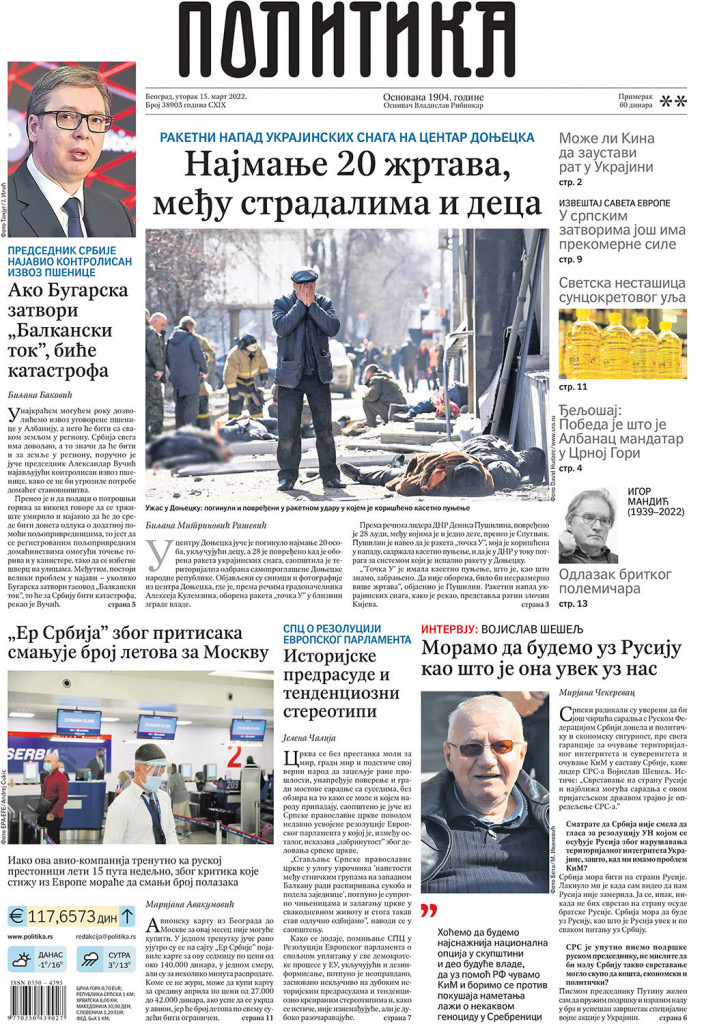
Blic, which has a role in maintaining the “pro-Western side” of the president, also writes about the pressure on Vučić (March 5), saying that Serbia could have lost more than 40,000 jobs if it had not voted for the UN Resolution. Blic sources close to the German Ministry of Economy report that representatives of the largest German companies operating in Serbia talked with the Ministry before the UN vote and agreed on the possibility of closing their businesses in Serbia due to “Serbia’s unclear position on the Ukrainian crisis”.
Serbian media show a high degree of empathy for Russians and compare Serbian suffering with Russian suffering, completely ignoring the crimes against Ukrainian citizens. Examples include: “Just as Serbs were hunted in March 1999 and years later, there is a hunt for Russians today.” (Politika, March 6). Pro-government media also write about Russophobia and the chasing down of Russians around the world. Politika, on the front page, published a correspondent from Norway (March 2) writing about “the hunt against children from Russia”, while Novosti (March 5) opined that the West has lost sight of the criteria for determining targets for sanctions against Moscow, and that children in kindergarten had been declared enemies.
Much has been written about sanctions against Russian artists and the expulsion of Russian content from the cultural scene. Writing for Sputnik (March 2), the well-known Serbian playwright and nationalist Dušan Kovačević, commenting on the decisions by “leaders of prestigious opera houses and festivals against Russia”, said: “That amount of hatred has not been seen for a long time and does not bode well […] These days we are marking 190 years since the National Library was opened. On April 6, 1941, it was destroyed as a target. It was hit in order to destroy the books. And they knew very well that personal books, written documents and archives of one nation, identity cards of one nation were kept among those books. So what is happening with art bans is nothing new.”
Consensus building, and attacks on dissidents
Pro-government media are encouraging the building of a consensus in support of Russia. The March 11 issue of Pečat published an article titled “NATO Agents and Russophobes: Quisling Circle”, which targeted dissidents in connection with the war in Ukraine. Novosti (March 5), following the official policy of declaring there to be no shortages, turned its sights on that “part of the opposition misusing the Ukrainian crisis by placing stories about fuel and food shortages and panic to increase their ratings”.
The Serbian Telegraf (March 1) published an opinion that “politicians and analysts of the so-called deep state of the European Union, but also America, are calling for a bloody scenario and a violent takeover of power in Belgrade […] The Ukrainian crisis has united the haters of Serbia, who openly threaten our country. Pressures go so far as to call for blood and announce a violent change of government in Serbia, such as the one on the Ukrainian Maidan, which was an overture to the war now being led by Kyiv and Moscow. The leading ones are well-known haters Carl Bildt, Janusz Bugajski, Florian Bieber, Daniel Server…” The Telegraf writes that this is confirmed by Vučić saying that the “pressures are strong, that the past days have been like a nightmare, and that the previous few days have been the most difficult in his career”.
False information and conspiracy theories
On the front page of Politika (March 9) an article entitled ‘Who Collects the DNA of Ethnic Russians’ was published. It contained incorrect quotes taken out of context from a statement by the director of the Cooperative Threat Reduction Program in Ukraine, Robert Pope, for the Bulletin of Nuclear Scientists. Although fact-seekers such as the Istinomer[7] portal have exposed this “news” as false, it has been repeated in other media, and Politika has never published a text denying it. In the Bulletin Pope pointed out that although “pathogens are stored at low temperatures without the possibility of replication, the infectious risk of these pathogens is significantly increased by laboratory damage or electricity cuts in the facilities […] If the ventilation system in the laboratories is damaged, pathogens that are handled at room temperature can spread quickly and be potentially contagious outside the damaged facility.” Nowhere in the interview does Pope say that these are laboratories for the systematic destruction of “ethnic Russians”, as stated in the text that is spreading in Serbia.
And not only in Politika; false news about the laboratories where Ukrainians, NATO and the United States work were reported by other media in order to demonize the Ukrainian side and its Western allies.
On March 8, Novosti published an article declaring “there were intentions to plant plague and cholera from a test tube on Russians “. A few days earlier, on March 2, the tabloid Alo published the article ‘NATO bases and Pentagon laboratories’, seeing it as indicative that epidemics of diseases eradicated in Europe a long time ago, such as cholera and mouse fever, have been detected in the vicinity of Pentagon laboratories in Ukraine, and that the cooperation between the Ukrainian Ministry of Health and the Pentagon began in 2005. Alo, one day after Politika (on March 10) published the piece ‘Americans made biological weapons’, saying that “the United States are worried that the Russian military could take control of the secret research centers.” On the front page (March 11) the newspaper Objektiv reports: “US secret affairs in Ukraine, biological war against Russia was prepared”.
The research of the Istinomer portal indicates that the disinformation spreading in the Russian, Chinese, but also domestic media about the development of biochemical weapons in Ukraine has no basis in reality: “This is a conspiracy theory that has been recycled so far in various armed conflicts, but also during the pandemic”[8].
Conclusion
Serbian media are part of the Russian propaganda machinery that creates an anti-Western atmosphere which increasingly distances Serbia from Euro-Atlantic integration. Public opinion, which has been overwhelmed by various conspiracy theories for years, is mostly on the Russian side when it comes to the Ukrainian war.
Russian propaganda has achieved mobilizing power. The numerous protests held daily in support of Russia are mostly organized by opposition parties and extreme right-wing organizations, but also by Russia itself. Serbia is the only country in Europe where a rally in support of Kremlin policy was held, attended by about 2,000 people.
Moscow has a very well-developed intelligence network in Serbia, RS and Montenegro, which realistically represents the potential for generating chaos, i.e. opening another military front. The media support has already been generated. Serbian media play a key role in deepening the pro-Russian worldview. President Vučić is also personally responsible for such a situation, in keeping the media “firmly under his control”, because he has been promoting that orientation since coming to power – even while allegedly striving for EU membership.
[1] Most printed and electronic media in Serbia are under regime control. Reports from international and local organizations warn of stifling media freedoms in Serbia, obstructing the work of professional media and attacks on independent journalists. In April 2021, the Rasrikavanje portal, which deals with detecting fake news and analyzing the media in Serbia, published an analysis of five dailies: Srpski Telegraf, Informer, Alo, Kurir and Večernje novosti.Analyzing the content published by these papers in 2020, the Raskrikavanje portal determined that all five papers were “extremely favorable” to the President of Serbia and the Serbian Progressive Party, Aleksandar Vučić, who, as they stated, was presented “almost without exception, always in a positive context.”According to the Freedom House report for 2021, the media are under pressure with threats by lawsuits against journalists, lack of transparency in media ownership; editorial pressure from politicians and politically connected media owners. The regulatory body for electronic media has been criticized for its lack of independence. Journalists have encountered physical attacks, dirty campaigns, criminal tax inspections and other types of pressure.
[2]Danas, 9 March 2022, https://www.danas.rs/vesti/drustvo/srednjoskolci-mahom-na-strani-rusije/
[3] This statement followed a tweet by the Sarajevo journalist and analyst Mirnes Kovač saying that President Putin was sending his highest security envoy to Belgrade and that a presidential plane was waiting for him. (Serbian President Aleksandar Vučić also spoke on this occasion: “You could see the hysteria against our country on Sunday regarding the fictitious plane with Patrushev, but also the fictional news that we do not support the territorial integrity of Ukraine…The situation is terribly difficult.” Politika, 8. March). The news about Patrushev’s arrival on the president’s plane was denied. However, the arrival of Patrushev in Belgrade was planned. Just a few days earlier Pečat, which has good sources in Moscow, wrote in the February 25 edition that the message that Russia would send to Serbia on February 28 through Petrushin could hardly be more different: “Russia will not let Serbia come out of its neutral position and make some sacrifices, without getting more than it has. For everything that Serbia already has, it should do nothing else but remain in its known and neutral position.”
[4] Novosti, 4 March 2022.
[5] Voice of America, 2 March 2022, https://www.glasamerike.net/a/srbija-lazne-vesti-ukrajina-rusija-rat-pandemija/6466774.html
[6] Voice of America, 2. March 2022, https://www.glasamerike.net/a/srbija-lazne-vesti-ukrajina-rusija-rat-pandemija/6466774.html
[7] Istinomer, 11. Mart 2022, https://www.istinomer.rs/facebook-provere/razvijanje-biohemijskog-oruzja-za-unistenje-rusa-reciklirana-teorija-zavere/
[8] Istinomer, https://www.istinomer.rs/facebook-provere/razvijanje-biohemijskog-oruzja-za-unistenje-rusa-reciklirana-teorija-zavere/


